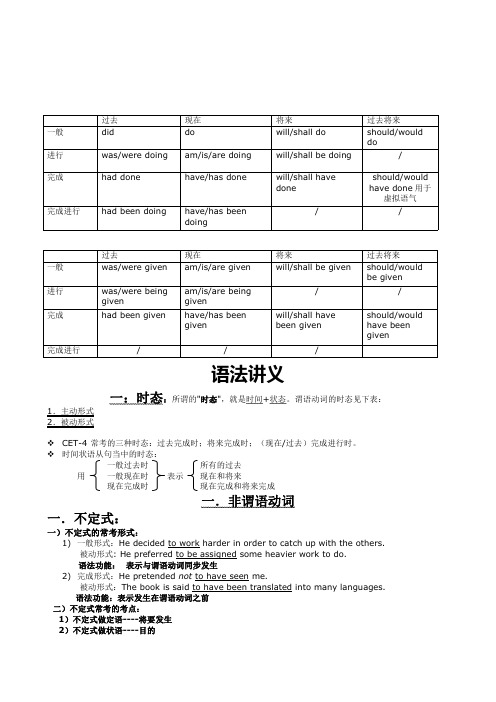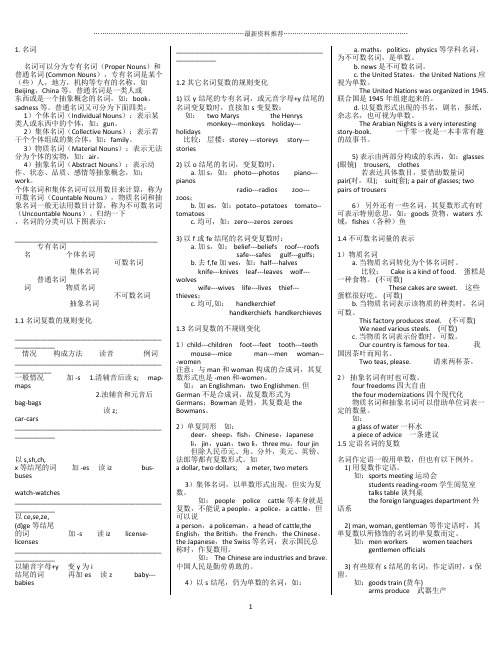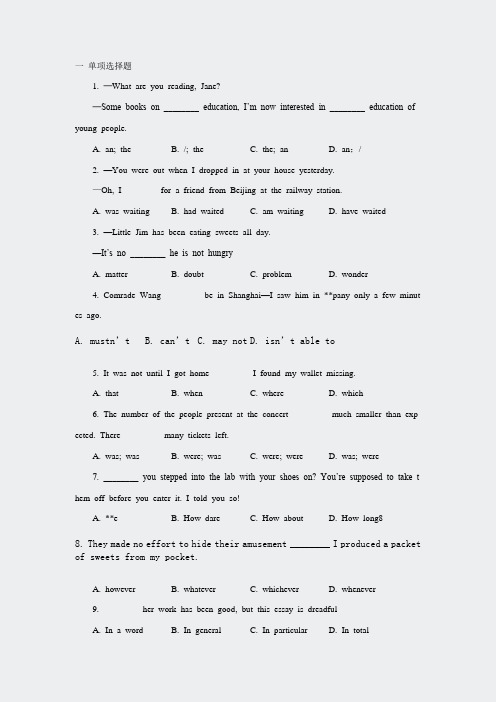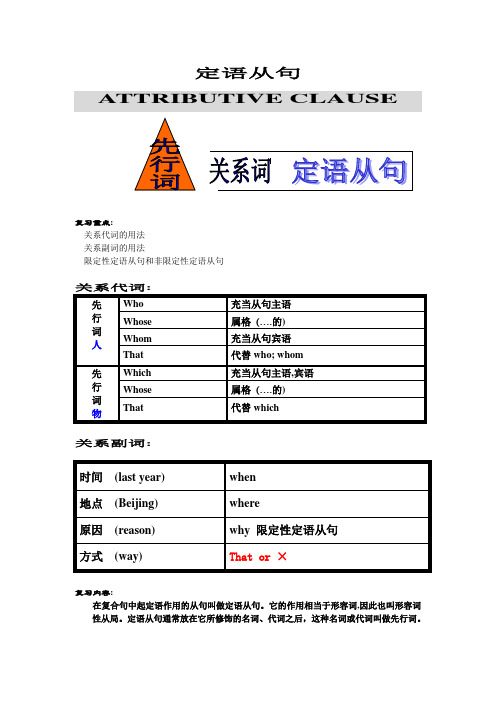专插本英语语法专项复习
专插本英语专业题目难点汇总及解析

本文件主要是对专插本英语专业语法难题进行汇总,并给予一定的讲解,让各位考生能够更好地进行复习。
(英语基础与写作)下面让我们开始罗列!1.On Sundays there were a lot of children playing in the park, _______ parents seated together joking.A.their B.whoseC.which D.That难点:这里大家极其容易选到whose或者which,但这题考的是独立主格。
该题答案为A。
大家要注意独立主格的结构是N+V-ing/ed形式。
(判断是否是独立主格看“逗号”,因为逗号意味着句子未结束,也就只能使用非谓语动词了。
)2.Tom says he won’t forget the day______ we worked together and the day ______ we spent together.A. when; whichB. what; thatC. which; whenD. on which; when难点:这里最难的是让大家判断选择which或者when。
这里大家首先要搞清楚什么是“关系代词”和“关系副词”的概念。
所谓关系代词,指的是这个代词即充当引导词,也可以当作从句里的成分(主语、宾语、补语);关系副词指的是该引导词不能用来充当从句当中的任一成分,只能拿来引导从句,添加意思用。
明白这一点,我们便可以对题目进行分析。
首先the day_____ we worked together 这一空,大家要明白work是这里是当作不及物动词使用,也就是不需要后面添加宾语,因此该句子是主谓结构,句子完整,不需要使用任何代词。
同时根据day这一单词可知是时间,因此使用“when”。
另一方面,第二个空the day ______ we spent together.又是怎么回事呢?其实很简单,因为spent可以当及物动词和不及物动词用,但是这里spent用作及物动词时,是度过、浪费,但充当不及物动词用的时候则是“花钱”的意思,因而这里需要接宾语,所以才会使用which充当从句引导词,同时当作从句的宾语使用。
专升本英语语法与词汇知识点总结

专升本英语语法与词汇知识点总结在专升本的英语考试中,语法和词汇是两个至关重要的部分。
掌握好这两方面的知识,对于提升英语成绩和语言运用能力有着举足轻重的作用。
下面,我将为大家详细总结专升本英语中常见的语法和词汇知识点。
一、语法知识点(一)动词时态1、一般现在时表示经常发生的动作、存在的状态或客观真理。
其构成是主语+动词原形(当主语是第三人称单数时,动词要加“s”或“es”)。
例如:“He often goes to school by bike”2、一般过去时表示过去发生的动作或存在的状态。
构成是主语+动词的过去式。
如:“I played basketball yesterday”3、现在进行时表示正在进行的动作。
其结构是“主语+ be 动词+动词的现在分词”。
比如:“They are watching TV now”4、过去进行时强调过去某个时间正在进行的动作,形式为“主语+ was/were +动词的现在分词”。
像:“I was reading a book at that time”5、现在完成时表示过去发生的动作对现在造成的影响或结果,或者从过去开始一直持续到现在的动作。
其构成是“主语+ have/has +过去分词”。
例如:“She has learned English for five years”6、过去完成时表示过去某个时间之前已经完成的动作,结构是“主语+ had +过去分词”。
比如:“By the end of last year, we had learned 2000 words”(二)语态1、主动语态主语是动作的执行者。
例如:“He opened the door”2、被动语态主语是动作的承受者,构成是“be +过去分词”。
如:“The door was opened by him”(三)非谓语动词1、动词不定式具有名词、形容词和副词的特征,可作主语、宾语、定语、状语等。
华师附中专插本英语 词汇结构专项复习(2)

巩固练习-形容词
5. I was (please) _________to have received your letter dated May 20th. 答案:pleased 译文:我很高兴收到你5月20日写给我的信。 分析:please是动词,但这里应该变成形 容词pleased后才有“高兴“的意思。be pleased to do sth. 意为”高兴做某事“。
形容词(品质 friend-friendly, year-yearly 的)
形容词 (充满) 形容词 (无)
名词加词缀变换为其他词性的情况
形容词(充满, storm-stormy, ease-easy, sun-sunny 性质) -ous 形容词(多) danger-dangerous -y -en -ist -ian 形容词(的) wood-wooden, gold-golden
常见名词后缀
名词加词缀变换为其他词性的情况
后缀 -ful
-less -al -ic -ical -ly
变换后的词性 举例 skill-skillful, success-successful care-careless, hope-hopeless tradition-traditional 形容词(的) industry-industrial history- historical (历史的) -historic(有历史意义的)
形容词(不,非)
en-ness -ty,-ity -th -age
动词(使成为)
名词(状态、性质) 名词(抽象名词) 名词(结果,过程) 名词(状态,集合)
able-enable, courage-encourage
happy-happiness, carelessness difficult-difficulty, possibility true-truth, death short-shortage
专转本英语语法高效复习

以 “S” 结尾 的表 示学 科或 专业 的名 词
Mathematics__ easy to learn. (is) 数学很容易学。 解析 有些学科或专业的名词虽以“s” 结尾,但概念上仍为单数。常 用的这类词 athletics(体育) classics (古典文学)economics (经济学) ethics(伦理学) linguistics (语言学) mathematics(数学) physics (物理学) politics(政治学)
以“S”结尾的单复数同行名 词
• 1、Every means __ been tried since then. (has) • 自从那时起,每一种方法都试用过了。 • 2、A whole series of mistakes __ to the present dilemma. (has led) • 一连串的错误导致现在的困境。
二、
有些集合名词可用作单数,也可用作复数,当表 示整体概念时作单数用。如:The team is the best in the league(这支队伍是联赛中最棒的.)但 当表示这个整体中所有的成员时,这些词就作复 数用。 如:The team are during to zhe game in their own cars.(队员们是开自己的车去参加比赛的) 常见的这类名词有:class(班级) Committee(委员会),couple(夫妻), crew(全体船员),faculty(全体教员), family(家庭),jury(陪审团),team(队)等。
解析
对这一类词考查的重点是在其作主语的时候
分辨其和谓语动词的一致关系。判断的时候 首先要分清它是单数还是复数,然后确定谓 语动词是单数还是复数。这一类词: crossroads (十字路口)headquarters(总部) means (手段)series(系列) species (物种) works(工厂)
专插本_大学英语语法总结

语法讲义一:时态:所谓的"时态",就是时间+状态。
谓语动词的时态见下表:1.主动形式2.被动形式CET-4常考的三种时态:过去完成时;将来完成时;(现在/过去)完成进行时。
时间状语从句当中的时态:一般过去时所有的过去用一般现在时表示现在和将来现在完成时现在完成和将来完成一.非谓语动词一.不定式:一)不定式的常考形式:1)一般形式:He decided to work harder in order to catch up with the others.被动形式:He preferred to be assigned some heavier work to do.语法功能:表示与谓语动词同步发生2)完成形式:He pretended not to have seen me.被动形式:The book is said to have been translated into many languages.语法功能:表示发生在谓语动词之前二)不定式常考的考点:1)不定式做定语----将要发生2)不定式做状语----目的过去现在将来过去将来一般diddowill/shall do should/would do进行was/were doing am/is/are doing will/shall be doing /完成had donehave/has donewill/shall have doneshould/would have done 用于虚拟语气完成进行had been doinghave/has been doing//过去现在将来过去将来一般was/were given am/is/are given will/shall be givenshould/would be given进行was/were being givenam/is/are being given//完成had been givenhave/has been givenwill/shall have been givenshould/would have been given完成进行///3)不定式充当名词功能---To see is to believe.三)不定式的省略1)感官动词see,watch,observe,notice,look at,hear,listen to,smell,taste,feel+do表示动作的完整性,真实性;+doing表示动作的连续性,进行性I saw him work in the garden yesterday.昨天我看见他在花园里干活了。
专插本英语语法大全精编版

1. 名词名词可以分为专有名词(Proper Nouns)和普通名词 (Common Nouns),专有名词是某个(些)人,地方,机构等专有的名称,如Beijing,China等。
普通名词是一类人或东西或是一个抽象概念的名词,如:book,sadness等。
普通名词又可分为下面四类:1)个体名词(Individual Nouns):表示某类人或东西中的个体,如:gun。
2)集体名词(Collective Nouns):表示若干个个体组成的集合体,如:family。
3)物质名词(Material Nouns):表示无法分为个体的实物,如:air。
4)抽象名词(Abstract Nouns):表示动作、状态、品质、感情等抽象概念,如:work。
个体名词和集体名词可以用数目来计算,称为可数名词(Countable Nouns),物质名词和抽象名词一般无法用数目计算,称为不可数名词(Uncountable Nouns)。
归纳一下,名词的分类可以下图表示:_______________________________________ 专有名词名个体名词可数名词集体名词普通名词词物质名词不可数名词抽象名词1.1 名词复数的规则变化________________________________________ ___________情况构成方法读音例词________________________________________ __________一般情况加 -s 1.清辅音后读s; map-maps2.浊辅音和元音后bag-bags读 z;car-cars________________________________________ ___________以s,sh,ch,x等结尾的词加 -es读 iz bus-buseswatch-watches________________________________________ ___________以ce,se,ze,(d)ge等结尾的词加 -s读 iz license-licenses________________________________________ ___________以辅音字母+y变y 为i结尾的词再加es读 z baby---babies ___________________________________________________1.2 其它名词复数的规则变化1) 以y结尾的专有名词,或元音字母+y 结尾的名词变复数时,直接加s变复数:如:two Marys the Henrysmonkey---monkeys holiday---holidays比较:层楼:storey ---storeys story---stories2) 以o 结尾的名词,变复数时:a. 加s,如: photo---photos piano---pianosradio---radios zoo---zoos;b. 加es,如:potato--potatoes tomato--tomatoesc. 均可,如:zero---zeros zeroes3) 以f或fe 结尾的名词变复数时:a. 加s,如: belief---beliefs roof---roofssafe---safes gulf---gulfs;b. 去f,fe 加ves,如:half---halvesknife---knives leaf---leaves wolf---wolveswife---wives life---lives thief---thieves;c. 均可,如:handkerchiefhandkerchiefs handkerchieves1.3 名词复数的不规则变化1)child---children foot---feet tooth---teethmouse---mice man---men woman---women注意:与 man 和 woman构成的合成词,其复数形式也是 -men 和-women。
英语练习题-语法选择题专插本doc

一单项选择题1. ─What are you reading, Jane?─Some books on ________ education, I’m now interested in ________ education of young people.A. an; theB. /; theC. the; anD. an;/2. —You were out when I dropped in at your house yesterday.—Oh, I________ for a friend from Beijing at the railway station.A. was waitingB. had waitedC. am waitingD. have waited3. —Little Jim has been eating sweets all day.—It’s no ________ he is not hungryA. matterB. doubtC. problemD. wonder4. Comrade Wang ________ be in Shanghai—I saw him in **pany only a few minut es ago.A. mustn’tB. can’tC. may notD. isn’t able to5. It was not until I got home ________ I found my wallet missing.A. thatB. whenC. whereD. which6. The number of the people present at the concert ________ much smaller than exp ected. There ________ many tickets left.A. was; wasB. were; wasC. were; wereD. was; were7. ________ you stepped into the lab with your shoes on? You’re supposed to take t hem off before you enter it. I told you so!A. **eB. How dareC. How aboutD. How long88. They made no effort to hide their amusement ________ I produced a packet of sweets from my pocket.A. howeverB. whateverC. whicheverD. whenever9. ________ her work has been good, but this essay is dreadfulA. In a wordB. In generalC. In particularD. In total10. She returned home from the office, only ________ the door open and something missing.A. findingB. to be foundC. to findD. found11. We should ________ ourselves assiduously and faithfully to the duties of our pro fession.A. devoteB. spendC. offerD. provide12. The Anti- Japanese War ________ in 1937 and it ________ eight years.A. broke out; lastedB. broke out; was lastedC. was broken out; lastedD. was broken out; was lasted13. When the plane arrived, some of the detectives were waiting inside the main buil ding ________others were waiting on the airfield.A. duringB. whereC. whichD. while14. ________ is known to everybody, Taiwan is a part of China.A. ItB. AsC. ThatD. Which15. —Let’s go to the zoo this Sunday, OK?—________. I love to see all kinds of animals.A. I couldn’t agree moreB. I’m afraid notC. I believe notD. I don’t think so二.有关名词用法的15道考题1. **mander said that two________ would be sent to the Iraqi front the next day.A. women’s doctorB. women doctorsC. women’s doctorsD. women doctor2. “Look! The police ________ here to keep order! Go away quickly,” one of them shouted.A. is comingB. comesC. **ingD. **e3. She could not speak English, but made her wishes known by means of _____.A. signsB. sighsC. movementsD. words4. In my opinion, what he told us just now about the affair simply doesn’t make any _____.A. ideaB. meaningC. senseD. point5. Shelly had prepared carefully for her English examination so that she could be sure of passing it on her first _____.A. intentionB. attemptC. purposeD. desire6. ________ food is kept in his new cave, but at last Saddam was still arrested.A. Large quantities ofB. A great deal ofC. A large number ofD. Quite a few7. ––Let’s try operating the machine right now.––Wait. Better read the _____first.A. instructionsB. explanationsC. informationD. introduction** rest of the magazines________ within half an hour.A. is sold outB. was sold outC. were sold outD. are sold out9. You’d have more _____of catching the train if you took a bus to the station inste ad of walking.A. opportunityB. chanceC. timeD. energy** number of deer, mountain lions and wild roses________ much if people leave thin gs________ they are.A. doesn’t change; asB. aren’t changed; likeC. don’t change; likeD. don’t change; as11. I knew I shouldn’t accept anything from such a person, but I found it difficult to turn down his _____.A. offerB. suggestionC. requestD. plan12.________it is to gather with President Bush at such a special Thanksgiving Day in Iraq!A. what a funB. what funC. how funD. what joy13. Oh., John________ you gave us!A. How a great surpriseB. how pleasant surpriseC. what a pleasant surpriseD. what pleasant surprise14 He is________ as a leader but he hasn’t________ in teaching.A. success; many experiencesB. a success; much experienceC. great success; an experienceD. a great success; a lot of experiences15 —Who did you spend last weekend with?—________.A. Palmer’sB. The Palmers’C. The PalmersD. The Palmer’s三.英语冠词训练题1. Which city in England do you think may be called _______ Shanghai of _______ West?A. a; theB. the;不填C. the; theD. 不填; the2. Dr. Smith wants ________ assistant with ________ good knowledge of English.A. the; theB. an; theC. an; aD.不填; 不填3. —What does her uncle do?—He is a professor of ________ university and he is ________ honest man.A. the;anB. a;aC. an;anD. a;an4. You made the same mistake for _____second time, dropping _____ “n” in the word “government”.A. a; theB. a; aC. the; anD. a; an5. It’s quite obvious that the aging population in China will cause _____heavy pressu re on _____whole society in the future.A. a; aB. the; 不填C. a; theD. 不填; the6. The poet and ________ writer is going to give us a talk this afternoon.A. aB. theC. 不填D. an7. Her husband was put into________ prison, and she had to go to________ prison o nce a month to visit him.A. a; theB. the; theC. 不填; 不填D. 不填; the8. Wu Dong is________ taller of________ two brothers.A. 不填; theB. the; 不填C. 不填; 不填D. the; the9 The teacher is standing ________ of the teacher’s table, which is ________ of the classroom.A. in front; in frontB. in front; in the frontC. in the front; in the frontD. in the front; in front10. I am in ________ charge of the class which was in ________ charge of my wife.A. 不填; theB. 不填; 不填C. the; 不填D. the; the11. The warmth of________ sweater will of course be determined by the sort of ___ _____ wool used.A. the; theB. the; 不填C. 不填; theD. 不填; 不填12. As _____rule, apples are sold by _____weight and eggs by _____dozen.A. a; 不填; theB. a; the; theC. a; a; theD. the;不填;不填13. In________ winter of 1990, he went abroad on ________ business.A. 不填; 不填B. the; 不填C. the; theD. the ;a14.—Judging from _____number of the cars, there are not many people in the club.—I think so. People would rather stay at home in such _____bad weather.A. the; 不填B. a; 不填C. the; aD. a; a15. The sign reads, “In case of ________ fire, break the glass and push ________ red button.”A. 不填; aB. 不填; theC. the; theD. a; a四.英语连词专项小练1. —Would you like to come to dinner tonight?—I’d like to, _______ I’m too busy.A. andB. toC. asD. but2. She set out soon after dark _______ home an hour later.A. arrivingB. to arriveC. having arrivedD. and arrived3. She thought I was talking about her daughter, _______, in fact, I was talking abo ut my daughter.A. whomB. WhereC. whichD. while4. Would you like a cup of coffee _______ shall we get down to business right awa y?A. andB. thenC. orD. otherwise5. Excuse me for breaking in, _______ I have some news for you.A. soB. andC. butD. yet6. We are going to the bookstore in John’s car. You **e with us ____ you can mee t us there later.A. butB. andC. orD. then7. They were surprised that a child should work out the problem _______ they thems elves couldn’t.A. onceB. thenC. whileD. if8. My name is Robert, _______ most of my friends call me Bob for short.A. thenB. insteadC. howeverD. but9. One mo re week, _______ we’ll complete the task.A. orB. so thatC. andD. if10. He was about to tell me the secret _______ someone patted him on the shoulder.A. asB. untilC. whileD. when11. The changes in the city will cost quite a lot, _______ they will save us money i n the long run.A. orB. sinceC. forD. but12. —Would you like to come to the dinner party here on Saturday?—Thank you. I’d love to, _______ I’ll be out of town at the wee kend.A. becauseB. andC. soD. but13. We were swimming in the lake _______ suddenly the storm started.A. whenB. whileC. untilD. before14. The shop doesn't open until 11 a.m., _______ it loses a lot of business.A. forB. orC. butD. so五.几道非谓语动词作状语易错考题分析1. He walked in, _________ a book in his hand, went to a table near the window a nd sat down in silence.A. carryingB. carriedC. to carryD. having carried【解析】答案选A。
专接本英语语法知识

定语从句A TTRIBUTIVE CLAUSE复习重点:关系代词的用法关系副词的用法限定性定语从句和非限定性定语从句关系副词:复习内容:在复合句中起定语作用的从句叫做定语从句。
它的作用相当于形容词,因此也叫形容词性从局。
定语从句通常放在它所修饰的名词、代词之后,这种名词或代词叫做先行词。
关系代词的用法1.关系代词w ho, whom, whose的用法(1.1) who和whom指代人, 在从句中, who作主语,whom作宾语。
Smith was one of those old men who always seemed in fine health.史密斯看起来是那种非常健康的老人。
He is the man who lives next door To us. 他就是住在我们隔壁的人。
I have just met a lady (whom) I saw last month.我刚刚遇到一位我上个月见过的女士。
Those who were present were disappointed at the report.在场的人们对报告感到失望。
(1.2) whose 指某某人的,在从句中作定语。
That’s the painter whose works are so highly regarded.那位就是作品受到高度评价的画家。
2.关系代词which whose 的用法:(2.1) which指物,可作从句的主语或宾语,作宾语时可省略。
The dog which was lost has been found.丢失的狗已经找着。
These are the books (which) he wrote when he was young. 这些是他年轻时写的书。
(2.2) whose 指某某物的,在从句中作定语。
I want to work in the laboratory whose facilities are complete.我想找家设备完善的实验室工作。
- 1、下载文档前请自行甄别文档内容的完整性,平台不提供额外的编辑、内容补充、找答案等附加服务。
- 2、"仅部分预览"的文档,不可在线预览部分如存在完整性等问题,可反馈申请退款(可完整预览的文档不适用该条件!)。
- 3、如文档侵犯您的权益,请联系客服反馈,我们会尽快为您处理(人工客服工作时间:9:00-18:30)。
被动语态复习要点归纳一、语态的基本概念和种类语态是动词的一种形式,用来表明主语与谓语动词之间的关系。
英语动词有两种语态:主动语态和被动语态。
主动语态表示主语是动作的执行者,被动语态表示主语是动作的承受者。
谓语动词为主动语态的句子叫主动句,谓语动词为被动语态的句子叫被动句。
一般说来,主动语态侧重于行为者,被动语态侧重于动作的对象或动作本身。
如:主动句:They built this bridge.被动句:This bridge was built by them.二、被动语态的构成被动语态由“be +及物动词的过去分词”构成,助动词be 有人称、数和时态的变化,其变化规则与be 作为系动词的变化完全一样。
英语主动语态的时态共有十六种,而被动语态只有十种。
三、八种常用时态的被动语态举例1.一般现在时A lot of books are kept in our school library. 我们学校图书馆有许多藏书。
2.一般过去时A thief was caught last night. 一个小偷昨晚被抓了。
3.现在进行时The watch is being repaired. 这块表正在修理。
4.过去进行时The door was being painted at that time. 那时门还在油漆。
5.一般将来时The class meeting will be held next Saturday afternoon. 班会下周六下午召开。
6.过去将来时They said the work would be finished the next day. 他们说这项工作第二天就能完成。
7.现在完成时My bag has been stolen. 我的包被偷了。
8.过去完成时She said this airport had never been used. 她说这个机场没有使用过。
四、被动语态的用法1.当不知道谁是动作的执行者时,用被动语态。
例如:His bike has been stolen. 他的自行车被热偷走了。
2.在没有必要或不想指出谁是动作的执行者时,用被动语态。
例如:China was librated in 1949. 中国是一九四九年解放的。
3.强调或突出动作的承受者时,用被动语态。
例如:The plan has already been made. 计划已经制订好了。
用被动语态时,如需同时指出动作的执行者,可用“介词by +动词执行者(宾格)”这一结构。
例如:Midnight was written by Mao Dun. 《子夜》是茅盾写的。
4.当出于行文的需要,被动结构更容易安排句子时。
They are going to build an apartment house here next year. It is going to be built right beside the Office Building. The plan was especially supported by those who wished to have more chance to speak English.五、使用被动语态应注意的事项1.及物动词能构成被动语态,不及物动词不能构成被动语态。
例如:Children sleep soundly. 小孩睡得香。
某些不及物动词与介词或副词构成不可分割的短语时,如有宾语,可用被动语态。
例如:The speaker was listened to carefully. 人们聆听发言人的讲话。
2.某些动词形式上是主动语态,但含有被动的意思。
例如:This book sells well. 这本书畅销。
3.把主动语态变为被动语态时,句中谓语动词变为被动语态,及物动词的宾语变为主语。
某些动词(如:give, send, pay, tell, lend, offer, show, throw, hand, bring, buy, get, make, leave等)有时带有两个宾语,有形成两种结构的可能。
例如:Someone gave me a book. 有人给我一本书。
变为被动语态时可能是:I was given a book (by someone). (比较常用)A book was given to me (by someone).4.带有情态动词的一般被动语态是“情态动词+be +过去分词”。
例如:The question needn’t be discussed. 这个问题不必讨论。
5.带有不定式的一般被动语态是“to be +过去分词”。
如:A new hotel is going to be built near the station. 车站附近要建一所新旅馆。
6.动词有两个宾语时大多把间接宾语变为主语,保留直接宾语。
如:He was asked a number of questions by the teacher. 老师问他很多问题。
7.成语动词改为被动语态时不可丢掉其后的介词或副词。
如:He was often made fun of by his classmates. 班上同学经常开他玩笑。
8.“介词in, on, under等+名词”构成介词短语既可表被动意义又可表主动意义。
(1)表示主动的常见词组有:be at desk (= be studying); be at work (= be working);(2)表示被动的常见词组有:be under discussion (= be being discussed); be under construction (=be being constructed倒装结构(inverted order)1. 用于never, hardly, little, not, no longer, not until, no sooner ... than, hardly ... when, neither, nor, no more等含否定意义的副词或连词开头的句子中。
At no time did he get permission for what he was doing.Not until the next morning did she realize how serious it was.Hardly had we walked in the door when the phone started ringing.2. 作状语的副词here, there, in, out, away, down, up, off, only等置于句首时,主语和谓语的一部分要倒装(部分倒装)。
Here comes the bus.Here you are.Away went his hat.Down there lives an old granny.3.作地点状语的介词短语置于句首时,主谓语要倒装(全倒装)。
这是一个考试热点。
如:On the top of the mountain stands a modern radar station.4. When So, nor and neither are used to express agreement or disagreement.You forgot your purse when you went out.—Good heavens, _______.A. so did IB. so I didC. I did soD. I so did点拨:选B。
三者含义不同:so did I 意为“我也做了……”;so I did意为“我的确做了……”;I did so意为“我照着(某人的吩咐等)做了……”。
根据句意不难判定答案是B。
I don't like dogs! Nor/Neither do I.5. Only + adverbial clause, or Only +adverb are placed at the beginningOnly then did I realize that he was right.Only when you work hard, can you feel the joy of success.需要注意的是,only只有修饰状语并置于句首时,主谓语才倒装,修饰其他成分时不倒装。
6. the if clause in conditional sentences can be rephrased through inversion:Were you to win the election, what's the first thing you'd do?= If you won the election …Had we known what the weather would be like, we wouldn't have come= If we had known what …Never before have I seen such awful behavior.Hardly had we walked in the door when the phone started ringing.Little do you know how much trouble you are in.定语从句定语从句是由关系代词或关系副词引导的从句,其作用是作定语修饰主句的某个名词性成分,相当于形容词,所以又称为形容词性从句.关系词引导定语从句的关联词称为关系词,关系词有关系代词和关系副词。
关系代词有that, which, who, whom, whose, as等,绝对没有what;关系副词有where, when, why等。
1,who, whom, that(1) Is he the man who/that wants to see you?(2) He is the man whom/ that I saw yesterday.(3)The man whom you spoke to just now is our English teacher2,Whose 用来指人或物(1) They rushed over to help the man whose car had broken down.(2) Please pass me the book whose color (the color of which) is green.(3) The man whose son is a doctor is our professor.3,which, that在从句中可作主语、宾语等,作宾语时可以省略(1)Prosperity which / that had never been seen before appearsin the countryside.(2) The package (which / that)you are carrying is about to come unwrapped.4,asas 可以做主语,也可以作宾语,作宾语时一般不省略,指人或者物。
